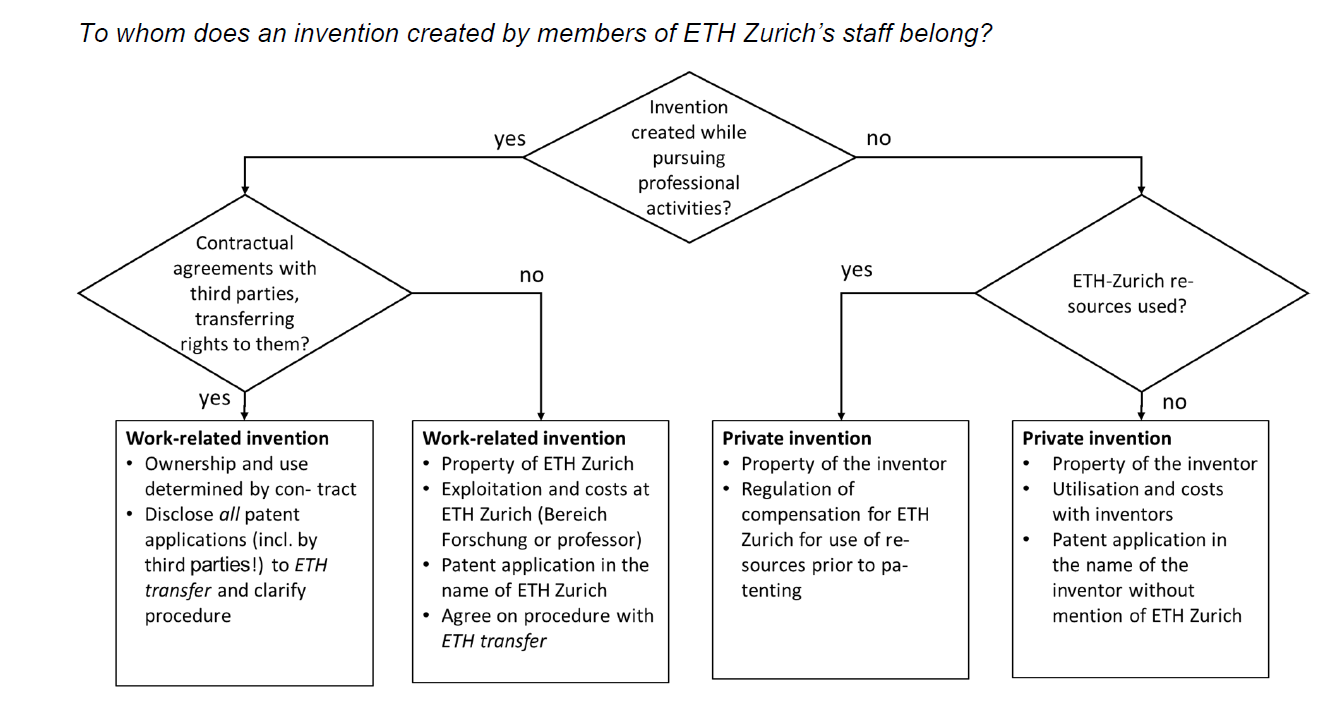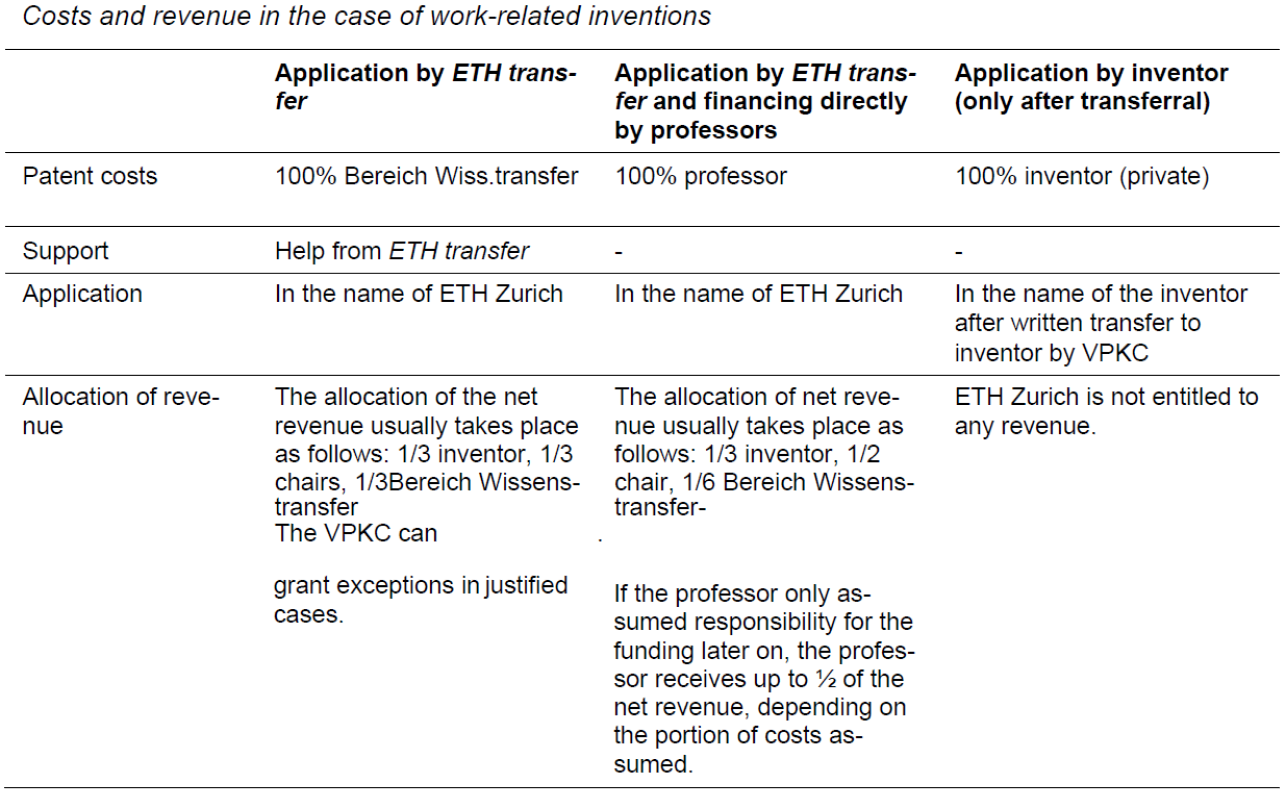Laws and templates
Guidelines for the Financial Exploitation of Research Results at ETH Zurich (Exploitation Guidelines)

The Exploitation Guidelines govern the commercial exploitation of research results at ETH Zurich, especially the exploitation of inventions and computer programs.
The guidelines are mandatory for all employees, including professors, at ETH Zurich.
Below are some key points of the Exploitation Guidelines. For further information, please refer to Download ETH Zurich exploitation guidelines (RS ETHZ 440.4) (PDF, 267 KB) or contact Patrizia Zuppinger
Work-related invention: Inventions created by an ETH Zurich employee while pursuing their professional activities shall be owned by ETH Zurich. Exception: inventions generated within the scope of research collaborations with third parties will be determined by a separate agreement.
Private invention: invention created by an ETH Zurich employee outside professional activities and without using ETH Zurich resources or infrastructure (e.g. working hours, equipment, lab), it shall belong to the inventor (private invention) and is not subject to these guidelines. Note: If ETH Zurich’s resources or infrastructure were used, ETH Zurich can claim compensation.
Student inventions: Inventions that are exclusively created by students who are not employed by ETH Zurich within the scope of their degree (e.g. within their Bachelor’s or Master’s projects) shall belong to the student(s) (private inventions) and are also not subject to these guidelines. Note: If members of ETH Zurich’s staff are also involved in such an student invention (e.g. supervisors of Bachelor’s or Master’s projects), ETH Zurich shall be entitled to joint-ownership of the invention.

- Inventors from ETH Zurich must disclose every invention in accordance with these guidelines to the technology transfer office ETH transfer in writing as quickly as possible via the “Invention Disclosure”
- All inventors involved in generating a work-related invention shall record the percentage distribution of the inventor shares amongst themselves in writing on the Invention Disclosure and send the signed original to ETH transfer.
- ETH transfer shall evaluate the patentability and usability of the invention and shall decide in no later than three months whether ETH Zurich will apply for a patent.
- All patent application based on work-related inventions must be filed in the name of ETH Zurich.
Application by ETH transfer: Patent costs shall be covered by ETH transfer only if:
- The invention appears to be patentable and of interest to ETH Zurich based on the information available
- The exploitation strategy has been discussed with ETH transfer in advance and ETH transfer endorses an exploitation
- There is a potential market or an interested party
Application by professor: If ETH transfer decides against an application, the professor(s) involved can submit a patent application at the research group’s expense or the expense of the institute in the name of ETH Zurich. Such a scenario will also be supervised administratively by ETH transfer.
Application by inventor: If ETH transfer and the respective institute or the professor is against filing a patent application, the inventors can request the written transferral of the invention and then file a patent application for the invention privately in their own name and at their own expense and exploit it.
Any revenue generated is initially used to cover the patenting and exploitation costs (e.g. for patent lawyers, official fees accrued or scheduled). The remaining revenue (= net revenue) shall normally be divided up as follows, subject to possible financial claims of third parties.
- 1/3 shall go to the inventors and be divided up in accordance with the share of inventors.
- 1/3 shall go to the professorship that created the invention, for research purposes
- 1/3 shall go centrally to ETH Zurich
Note: If a patent application is funded wholly or in part by the professor, his/her share shall increase to max. 50%. Please see the table below for more detailes.

Other relevant laws and guidelines
ETH law external page (SR 414.110)
Common licensing principles for spin-offs in the ETH Domain (external page website ETH Board)
Intellectual property rights of students (German only) external page (SR 414.135.1)
Templates and Forms
Material transfer agreement protected page checklist (with ETH log-in)
Material transfer agreement template (contact Andrea Haag)
Invention Disclosure Download Form (PDF, 543 KB)
Software Disclosure protected page Form
Further links
external page Open Source Initiative
Swiss copyright external page (webpage IPI)